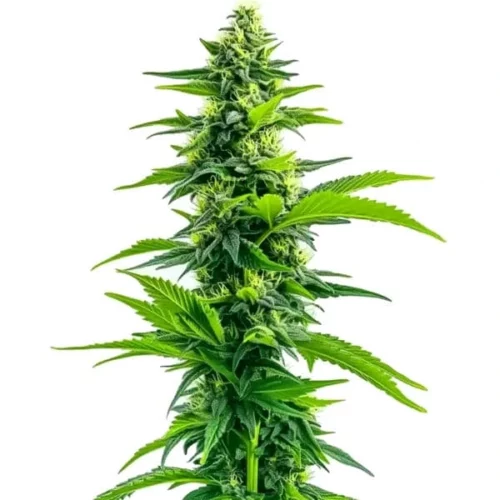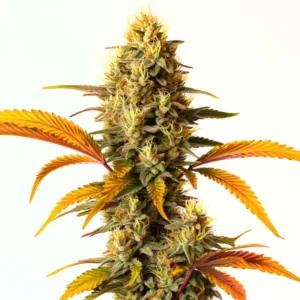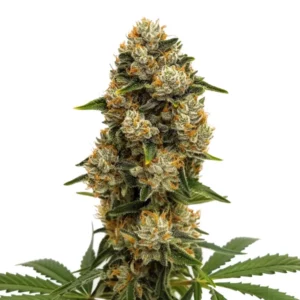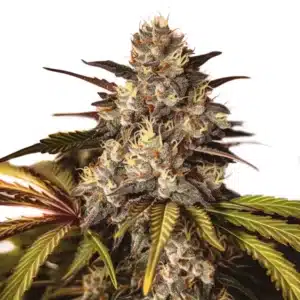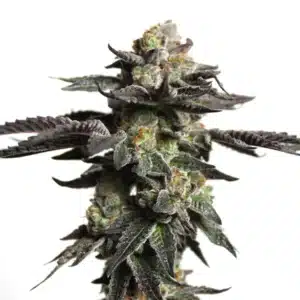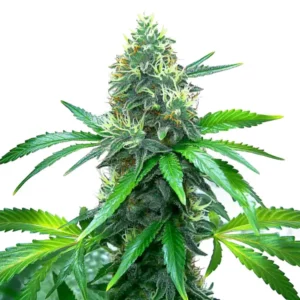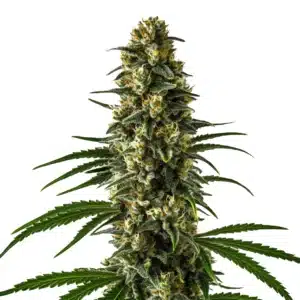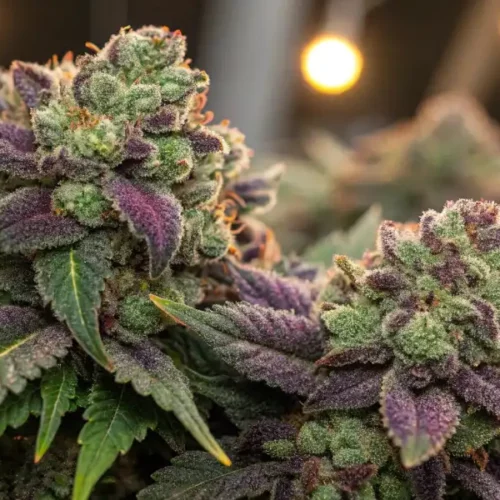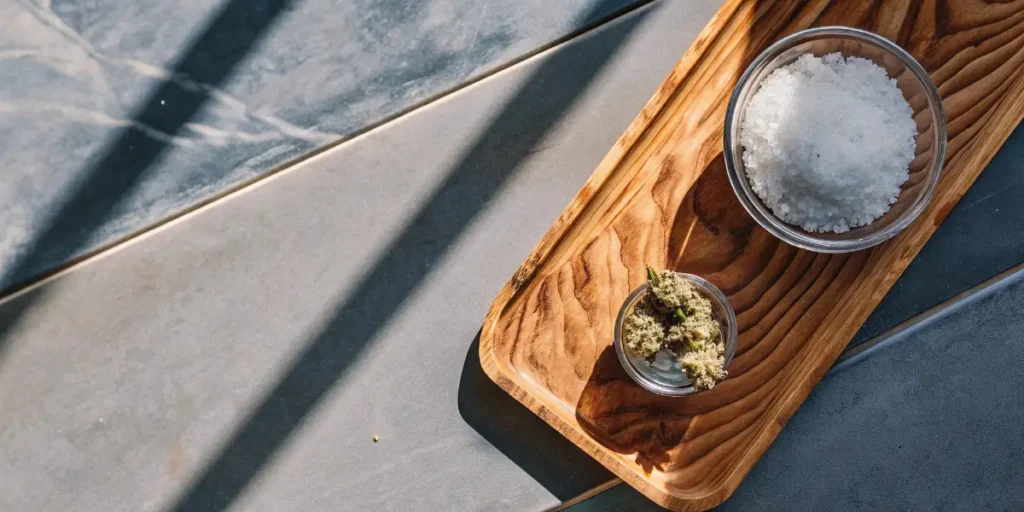
Salicylic Acid and Cannabis Immunity
Salicylic acid is not just for skincare. It’s a game-changer for cannabis growers. This natural compound, found in many plants, plays a critical role in enhancing cannabis immunity. It helps plants defend against diseases and pests without harmful chemicals. Whether you’re a seasoned grower or new to the field, knowing how salicylic acid can boost your cannabis plants’ health is essential.
Think of salicylic acid as a booster shot for your plants. It strengthens their natural defenses, helping them resist harmful pathogens. This is particularly important for cannabis, which can be prone to diseases. With salicylic acid, you can help your plants grow stronger and more resilient.
Recommended Strains
Acapulco Gold
 THC: 15% - 19%
THC: 15% - 19% Type of seed: Feminized
Type of seed: Feminized Phenotype: Mostly Sativa
Phenotype: Mostly Sativa Day to flower: 10 - 12 weeks
Day to flower: 10 - 12 weeks
Acapulco Gold Autoflower
 THC: 20% - 24%
THC: 20% - 24% Type of seed: Autoflowering
Type of seed: Autoflowering Phenotype: Mostly Sativa
Phenotype: Mostly Sativa Day to flower: 8 - 10 weeks
Day to flower: 8 - 10 weeks
Using salicylic acid effectively requires some know-how. It’s about timing and dosage. Apply it during the vegetative stage for maximum benefit. Too much can be just as bad as too little. Finding that sweet spot is key to enhancing cannabis immunity using salicylic acid.
The Science Behind Salicylic Acid Effects on Cannabis Plant Immunity
Salicylic acid is a plant hormone, a type of natural chemical that helps plants respond to stress. When a cannabis plant detects a threat, like a pathogen, it produces salicylic acid. This triggers a series of defensive actions, enhancing the cannabis resistance to pathogens.
Research shows that salicylic acid can speed up the plant’s immune response. It acts like an alarm system, alerting cells to prepare for battle. This makes cannabis plants quicker to respond when under attack, reducing the impact of diseases.
The role of salicylic acid in cannabis immune response is multifaceted. It not only triggers immediate defense mechanisms but also prepares the plant for potential future invasions. This preparation is crucial for cannabis plant disease resistance with salicylic acid, as it minimizes the plant’s recovery time after an attack. Salicylic acid and cannabis immunity work hand in hand to ensure the plant’s survival and productivity.
Moreover, the effects of salicylic acid on cannabis plant immunity have been demonstrated in various studies. These studies highlight the hormone’s ability to enhance systemic acquired resistance, a plant-wide immune response that provides long-lasting protection. This is particularly beneficial in environments where cannabis plants are constantly exposed to pathogens, ensuring they remain healthy and vigorous.
How Salicylic Acid Enhances Cannabis Immunity
By applying salicylic acid externally, you can boost this natural process. It’s like giving your plants a head start. They become better equipped to deal with stressors, leading to healthier growth. This is particularly useful in environments where plants face multiple threats.
One of the exciting things about salicylic acid is its ability to help plants build a memory of past infections. This means even if a plant has been attacked before, it can respond faster and more effectively next time. It’s like training your plants to become fighters.
The enhancement of cannabis immunity using salicylic acid is not merely about immediate defense. It’s about creating a robust and lasting system of protection. This ongoing enhancement ensures that cannabis plants are not only ready to face current threats but are also prepared for future challenges. This proactive approach leads to healthier plants and more abundant yields.
Salicylic acid and cannabis resistance to pathogens form a symbiotic relationship, where the hormone’s presence signals the plant to fortify its defenses continuously. This means that even in the absence of immediate threats, the plant remains vigilant, ready to deploy its defenses at the slightest sign of danger. This constant state of readiness is what makes salicylic acid such a valuable tool for cannabis growers.
Promos & Deals
Practical Applications of Salicylic Acid in Cannabis Cultivation
Applying salicylic acid doesn’t require a degree in horticulture. It’s straightforward. Mix it with water and spray it on your plants. Focus on the leaves as they are the primary site of pathogen entry.
Timing matters. Apply during early morning or late afternoon to avoid the harsh midday sun, which can cause leaf burn. Regular treatments can help maintain high immunity levels, crucial for cannabis plant disease resistance with salicylic acid.
To maximize the salicylic acid effects on cannabis plant immunity, consistency is key. Regular application ensures that the plants maintain a heightened state of defense, reducing the likelihood of disease outbreaks. This regular maintenance is especially important in regions with high humidity or frequent rainfall, where pathogens thrive.
Furthermore, combining salicylic acid treatments with other organic pest control methods can provide a comprehensive approach to plant health. This holistic strategy not only enhances individual plant immunity but also contributes to a healthier growing environment overall. By doing so, growers can achieve a sustainable and productive cultivation process.
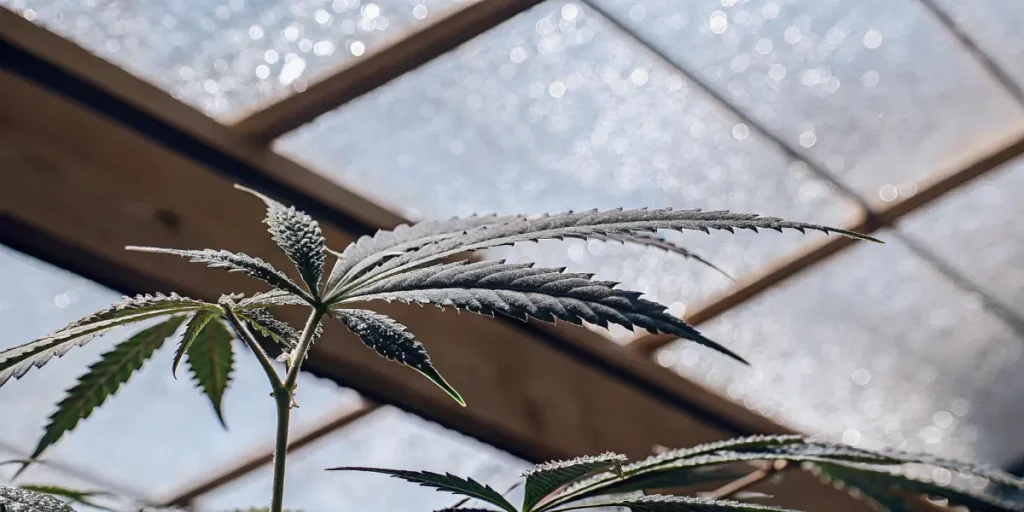
Salicylic Acid Dosage and Application Tips
Finding the right dosage is crucial for success. Start with a low concentration and observe your plants’ responses. Gradually increase the dose if needed. Overuse can lead to leaf burn or stunt growth, so moderation is key.
It’s also important to pair salicylic acid treatments with other good practices. Regularly check for pests, ensure proper watering, and maintain good air circulation. These factors work together to keep your plants healthy and strong.
Knowing the function of salicylic acid in cannabis immune response means recognizing that each plant may react differently. Therefore, it’s essential to tailor the dosage to the specific needs of your cannabis strains. This personalized approach ensures that each plant receives the optimal amount of support for its immune functions.
In addition to monitoring dosage, growers should also pay attention to environmental factors that may influence the effectiveness of salicylic acid. Factors such as temperature, humidity, and soil composition can affect how well the plants absorb and utilize the hormone. By considering these variables, growers can fine-tune their application strategies to achieve the best results.
Enhancing Cannabis Immune Response with Salicylic Acid
Cannabis plants, like humans, have an immune system. It’s not exactly the same, but they do have ways to fight off infections. Salicylic acid plays a vital role in this process, acting as a signal for the plant to activate its defenses.
This hormone helps plants produce pathogenesis-related proteins that attack invading pathogens. It’s like having an army on standby, ready to defend the plant at a moment’s notice. This improves the plant’s overall health and productivity.
The interplay between salicylic acid and cannabis immunity is crucial for maintaining a robust defense system. By consistently enhancing cannabis immunity using salicylic acid, growers can ensure that their plants remain resilient against a wide range of threats. This proactive approach not only prevents disease but also supports vigorous plant growth.
Furthermore, salicylic acid’s ability to enhance the plant’s immune response has implications beyond disease prevention. It also contributes to the plant’s overall vitality and yield potential. By fostering a strong immune system, growers can achieve healthier plants that produce higher-quality flowers, ultimately boosting the success of their cultivation efforts.
Choosing the Right Strains for Salicylic Acid Enhancement
The effectiveness of salicylic acid can vary depending on the cannabis strain. Some strains respond better than others. For instance, OG Kush is known for its strong immune response, making it an excellent candidate for salicylic acid treatment.
When selecting strains, consider their natural resistance levels. Strains with high resilience benefit most from additional support. This results in healthier plants and potentially higher yields.
Choosing strains with a natural affinity for salicylic acid effects on cannabis plant immunity can significantly enhance cultivation outcomes. These strains, when supported by regular salicylic acid applications, can develop an even stronger defense system, ensuring optimal growth and productivity.
Besides, knowing the unique characteristics of each strain allows growers to customize their application strategies. By aligning the treatment schedule with the specific needs of their chosen strains, growers can maximize the benefits of salicylic acid and cannabis immunity, leading to a more successful and rewarding cultivation experience.
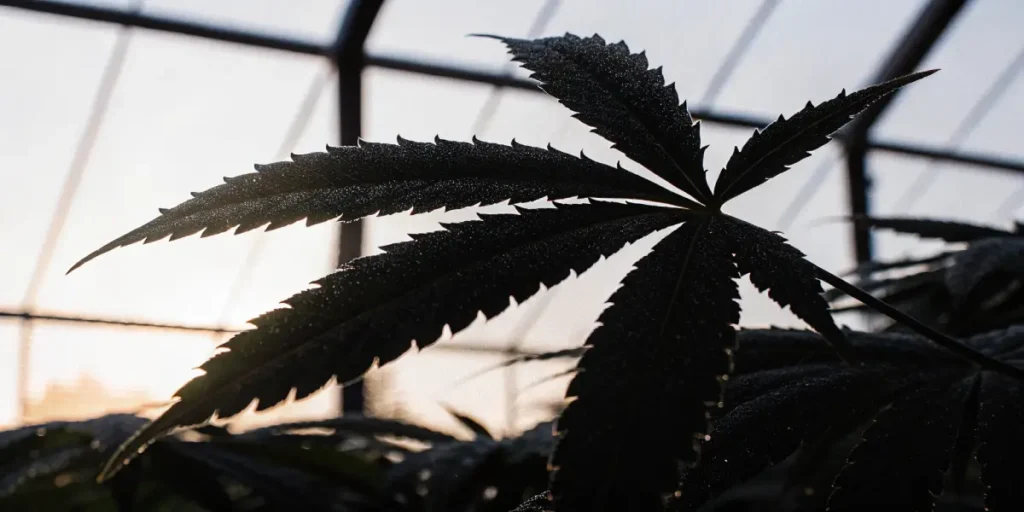
FAQs
What is the function of salicylic acid in cannabis immune response?
Salicylic acid acts as a signal that triggers the plant’s defense mechanisms. When applied, it helps the plant produce proteins that fight off infections. This strengthens the plant’s natural immunity, making it more resistant to diseases.
This process is similar to our immune system’s reaction to pathogens. By boosting the plant’s defenses, growers can reduce the impact of diseases, ultimately leading to a healthier crop.
The function of salicylic acid in cannabis immune response is pivotal for maintaining plant health. It serves as a catalyst for the activation of various defense pathways, ensuring that the plant remains protected against potential threats. This proactive defense mechanism is essential for preventing disease outbreaks and ensuring crop success.
Moreover, the application of salicylic acid and cannabis immunity is not limited to pathogen defense. It also plays a role in enhancing the plant’s overall resilience, allowing it to withstand environmental stressors such as drought and temperature fluctuations. This comprehensive approach to plant health is what makes salicylic acid an invaluable tool for cannabis growers.
How does salicylic acid enhance cannabis resistance to pathogens?
Salicylic acid helps activate the plant’s immune response, leading to quicker reactions to pathogens. This minimizes damage and prevents diseases from spreading. It’s like giving the plant an early warning system.
Regular applications can maintain high levels of resistance, crucial for preventing outbreaks. This is particularly beneficial in environments where plants face constant threats from various pathogens.
The enhancement of cannabis resistance to pathogens through salicylic acid is a game-changer for growers. By consistently applying the hormone, plants can establish a fortified barrier against invading pathogens. This ensures that even if an infection occurs, its impact is minimized, preventing widespread damage.
Besides to providing a direct defense against pathogens, salicylic acid and cannabis resistance to pathogens also improve the plant’s overall vigor. A healthy, resilient plant is better equipped to recover from stress and continue producing high-quality yields. This holistic approach to plant care is what makes salicylic acid a vital component of successful cannabis cultivation.
Can salicylic acid be used with all cannabis strains?
While salicylic acid can benefit many strains, its effectiveness can vary. Strains like Blue Dream, Girl Scout Cookies, and OG Kush show strong responses to salicylic acid treatments. These strains naturally have robust immune systems, which are enhanced by the hormone.
It’s essential to monitor each strain’s response to ensure optimal results. Some strains may require different dosages or application frequencies, so it’s important to adjust based on their needs.
When considering the use of salicylic acid across various strains, it’s important to recognize that each strain has unique characteristics. Some may exhibit a more pronounced response to salicylic acid effects on cannabis plant immunity, while others may require tailored application strategies to achieve the best results.
For growers looking to optimize their use of salicylic acid, experimentation and observation are key. By carefully monitoring how different strains respond to the hormone, growers can fine-tune their techniques to suit the specific needs of their plants, ensuring robust health and productivity.
Are there any risks associated with using salicylic acid on cannabis plants?
When used correctly, salicylic acid is safe for cannabis plants. However, overuse can lead to leaf burn or stunted growth. It’s important to start with low concentrations and gradually increase if needed.
Monitoring the plants’ responses is crucial to prevent any adverse effects. Combining salicylic acid with good cultivation practices can mitigate risks and enhance plant health.
While salicylic acid offers numerous benefits, it’s important to be aware of potential risks. Over-application can lead to phytotoxicity, where the plant’s leaves exhibit signs of stress such as yellowing or browning. This underscores the importance of carefully monitoring salicylic acid and cannabis immunity applications to avoid adverse effects.
Additionally, environmental factors can influence the plant’s response to salicylic acid. Factors like temperature and humidity can affect how the hormone is absorbed and utilized by the plant. By considering these variables, growers can optimize their application techniques to minimize risks and maximize the benefits of salicylic acid on cannabis plants.
How often should salicylic acid be applied to cannabis plants?
The frequency of application depends on the plant’s condition and environmental factors. Generally, applying salicylic acid every couple of weeks during the vegetative stage is beneficial. This maintains a strong immune response throughout the growing period.
Adjustments may be needed based on the strain and its environment. Regular monitoring and timely applications can ensure the best results, leading to healthier and more productive plants.
The key to effective use of salicylic acid in cannabis cultivation lies in its timing and frequency. Regular applications during the vegetative stage allow the plant to build up its defenses gradually, ensuring a robust immune response as it transitions to the flowering stage.
For growers seeking to enhance cannabis immunity using salicylic acid, it’s important to remain flexible and adaptable. Environmental changes, such as shifts in weather patterns or pest pressures, may necessitate adjustments to the application schedule. By staying vigilant and responsive, growers can ensure their plants receive the optimal support they need for successful growth and yields.

